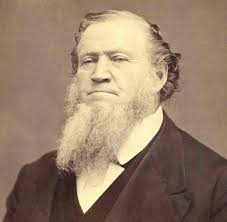After my last post, I fully expected some people to call me deluded, racist, or worse. I have been pleasantly surprised. I have received very few derogatory comments. I guess I need to learn to be more optimistic.
I promised to focus on two questions in this post:
1-If the policy to restrict men and women of African descent from receiving the full blessings of the gospel for 126 years was actually God´s will, then why did He do it?
I promised to focus on two questions in this post:
1-If the policy to restrict men and women of African descent from receiving the full blessings of the gospel for 126 years was actually God´s will, then why did He do it?
2-If it was truly His will, is God a racist?
Let´s go back in time about 2,000 years, to when Jesus himself walked the earth. In the New Testament, Matthew 15, we are told the story of a Gentile (non-Jewish) woman that approached Jesus asking for help for her daughter that was “grievously vexed with a devil.” The story continues,
But he answered her not a word. And his disciples came and besought him, saying, Send her away; for she crieth after us.
But he answered and said, I am not sent but unto the lost sheep of the house of Israel.
Then came she and worshipped him, saying, Lord, help me.
But he answered and said, It is not meet to take the children’s bread, and to cast it to dogs.
And she said, Truth, Lord: yet the dogs eat of the crumbs which fall from their masters’ table.
Let´s go back in time about 2,000 years, to when Jesus himself walked the earth. In the New Testament, Matthew 15, we are told the story of a Gentile (non-Jewish) woman that approached Jesus asking for help for her daughter that was “grievously vexed with a devil.” The story continues,
But he answered her not a word. And his disciples came and besought him, saying, Send her away; for she crieth after us.
But he answered and said, I am not sent but unto the lost sheep of the house of Israel.
Then came she and worshipped him, saying, Lord, help me.
But he answered and said, It is not meet to take the children’s bread, and to cast it to dogs.
And she said, Truth, Lord: yet the dogs eat of the crumbs which fall from their masters’ table.
Jesus stated that he was not sent to anyone except Jews (in this context meaning any of the descendants of Israel). He compared everyone else to “dogs”! Did that make Jesus a racist? He said that he was sent only to the lost sheep of Israel, meaning sent by His Father. Does that make God the Father a racist? Did Jesus hate Gentiles? If so, why is the vast majority of the Christian religion today made up of Gentiles, with relatively few Jews participating?
The answer is that it was not about racism. It simply was not the Gentiles’ turn. For whatever reason, that we may not comprehend, the Gentiles could not have the blessings of the gospel at that time; they had to wait for their turn, which came a few years after Jesus death. It came via revelation to the apostle Peter, the leader of the Church in his day.
A teaching that is quite common in the scriptures is that “. . . many that are first shall be last; and the last shall be first.” (New Testament: Matthew 19:30, 20:16, Mark 10:31, Luke 13:30; Book of Mormon: 1 Nephi 14:32, Ether 13:12; Doctrine and Covenants: 29:30). Israel was the first to receive the blessings of the gospel, and then the Gentiles (everybody else) would get their chance later on; they were last. The Old and New Testaments are all about Israel´s opportunity to receive the blessings of the gospel, which it rejected repeatedly, and then the beginning of the Gentiles time. Israel´s opportunity ended when they killed their final prophet, the Son of God (see Matthew 21:23-46). Then, with the revelation given to Peter, the apostles’ efforts turned to the Gentiles. Israel was first; the Gentiles were last.
The answer is that it was not about racism. It simply was not the Gentiles’ turn. For whatever reason, that we may not comprehend, the Gentiles could not have the blessings of the gospel at that time; they had to wait for their turn, which came a few years after Jesus death. It came via revelation to the apostle Peter, the leader of the Church in his day.
A teaching that is quite common in the scriptures is that “. . . many that are first shall be last; and the last shall be first.” (New Testament: Matthew 19:30, 20:16, Mark 10:31, Luke 13:30; Book of Mormon: 1 Nephi 14:32, Ether 13:12; Doctrine and Covenants: 29:30). Israel was the first to receive the blessings of the gospel, and then the Gentiles (everybody else) would get their chance later on; they were last. The Old and New Testaments are all about Israel´s opportunity to receive the blessings of the gospel, which it rejected repeatedly, and then the beginning of the Gentiles time. Israel´s opportunity ended when they killed their final prophet, the Son of God (see Matthew 21:23-46). Then, with the revelation given to Peter, the apostles’ efforts turned to the Gentiles. Israel was first; the Gentiles were last.
Members of the Church of Jesus Christ of Latter Day Saints believe that after the death of Christ and the Apostles, there was a gradual falling away from truth and authority, what we call “The Great Apostasy”. That is why Latter Day Saints do not associate themselves with either Catholic (Roman or Orthodox) or Protestant religions. We believe that Christ´s original organization and teachings are being restored in our day, first through Joseph Smith, and continuing through every modern day prophet up to the current prophet, Thomas S. Monson. The restoration was first made available to the Gentiles. After first coming to the Gentiles, the Church sent missionaries to indigenous peoples throughout North and South America, some of whom we believe to be descendants of Israel. Modern day Jews have yet to participate in the gospel in any significant way, although the Lord has not specifically prohibited them from taking part. Some in the US and in other countries have accepted the gospel, but Israeli law currently proscribes proselyting in Israel itself. We hope for that to change in the future, and in fact scripture tells us that it will.
Hence, the first shall be last and the last shall be first.
Why did God do this? I really don´t know. Is it because God is a racist? That doesn´t make a whole lot of sense, does it. Why would an omnipotent and omniscient being, whom the scriptures state is the personification of love, and whom we call “Father”, create races that he did not love? How could he possibly love one race over another, when he created us all, loves us all? We, as members of the Church of Jesus Christ of Latter Day Saints believe in a God who loves all of His children,
The Church of Jesus Christ of Latter Day Saints has no official position on why God works in this fashion. We simply know from scripture that he does, so, it would not be a stretch to understand that He may work in the same way in relation to other peoples. Take, for example, the proscription, through Brigham Young, against black Africans receiving the priesthood and participating in temple ordinances. Scripture shows that this would not be the first time that God made blessings available to one group of people and not to another.
Hence, the first shall be last and the last shall be first.
Why did God do this? I really don´t know. Is it because God is a racist? That doesn´t make a whole lot of sense, does it. Why would an omnipotent and omniscient being, whom the scriptures state is the personification of love, and whom we call “Father”, create races that he did not love? How could he possibly love one race over another, when he created us all, loves us all? We, as members of the Church of Jesus Christ of Latter Day Saints believe in a God who loves all of His children,
The Church of Jesus Christ of Latter Day Saints has no official position on why God works in this fashion. We simply know from scripture that he does, so, it would not be a stretch to understand that He may work in the same way in relation to other peoples. Take, for example, the proscription, through Brigham Young, against black Africans receiving the priesthood and participating in temple ordinances. Scripture shows that this would not be the first time that God made blessings available to one group of people and not to another.
I remember working as a missionary in Northern Brazil in an area where we were having a great deal of success. There was a city just a few miles to the west of where we were working that we felt would also yield fruits. After spending a good deal of time there without baptizing anyone, we became frustrated. When the mission president found out that we were working in that city, he ordered us to leave it at once, and prohibited our working there again. He said that the Lord had not yet opened that city for the preaching of the restored gospel, and he told us not to return. You see, the people in that city were not yet ready to receive the gospel, therefore it was not offered to them. Today, 33 years later, the gospel thrives there, with many active congregations. At a certain point, the people became prepared; then the gospel, and all its blessings, was presented to them.
As far as black Africans and the priesthood, the church has disowned all of the explanations that church members and some leaders have offered in the past regarding why God placed that restriction. Therefore, the only explanation left to us is this: God does things in His own way and in His own time, for the best possible benefit to His children. In the Doctrine and Covenants Section 29:30, He said to Joseph Smith, "But remember that all my judgments are not given unto men…” And to the prophet Isaiah he said, “For my thoughts are not your thoughts, neither are your ways my ways, saith the Lord. For as the heavens are higher than the earth, so are my ways higher than your ways, and my thoughts than your thoughts.” (Isaiah 55:8-9).
He doesn´t always tell us why He does everything that He does, sometimes because we just wouldn´t understand, and sometimes to test our faith (Moses 5:6, Genesis 22:1-14). When we doubt Him, when we doubt His prophets simply because what they say is hard to bear, we fail the test.
I do not hold a grudge against the Lord or His prophets because my ancestors were denied the blessings of the gospel. I do not demand an apology from either the Lord or His Church. Black Africans are now recipients of all the blessings of the gospel, and have been for 37 years. It’s time to stop dwelling on the past and making demands of the Lord or His Prophets. The Church does not apologize for executing the Lord´s will.
As far as black Africans and the priesthood, the church has disowned all of the explanations that church members and some leaders have offered in the past regarding why God placed that restriction. Therefore, the only explanation left to us is this: God does things in His own way and in His own time, for the best possible benefit to His children. In the Doctrine and Covenants Section 29:30, He said to Joseph Smith, "But remember that all my judgments are not given unto men…” And to the prophet Isaiah he said, “For my thoughts are not your thoughts, neither are your ways my ways, saith the Lord. For as the heavens are higher than the earth, so are my ways higher than your ways, and my thoughts than your thoughts.” (Isaiah 55:8-9).
He doesn´t always tell us why He does everything that He does, sometimes because we just wouldn´t understand, and sometimes to test our faith (Moses 5:6, Genesis 22:1-14). When we doubt Him, when we doubt His prophets simply because what they say is hard to bear, we fail the test.
I do not hold a grudge against the Lord or His prophets because my ancestors were denied the blessings of the gospel. I do not demand an apology from either the Lord or His Church. Black Africans are now recipients of all the blessings of the gospel, and have been for 37 years. It’s time to stop dwelling on the past and making demands of the Lord or His Prophets. The Church does not apologize for executing the Lord´s will.





 RSS Feed
RSS Feed
